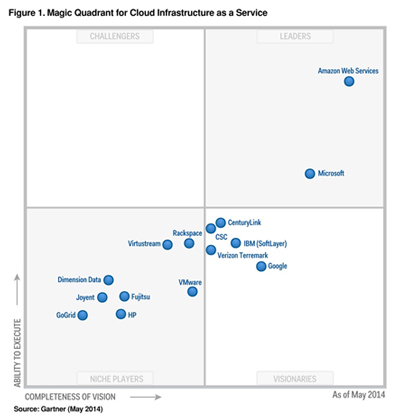News
Azure Behind Only Amazon in Gartner Cloud Rankings
Gartner also says Azure is still "Microsoft-centric," appealing primarily to .NET developers.
Microsoft's been investing huge amounts of time and money to build out its Azure cloud service. Those efforts appear to be paying off, according to a new report.
In its latest Magic Quadrant report for Infrastructure as a Service (IaaS) providers, research firm Gartner deemed Amazon and Microsoft to be the clear market leaders -- a first for Microsoft in that category.
In its assessment of the major cloud service providers, Gartner wrote of Azure Infrastructure Services:
"Microsoft has a vision of infrastructure and platform services that are not only leading stand-alone offerings, but that also seamlessly extend and interoperate with on-premises Microsoft infrastructure (rooted in Hyper-V, Windows Server, Active Directory and System Center) and applications, as well as Microsoft's SaaS offerings. Its vision is global, and it is aggressively expanding into multiple international markets. ... It is second in terms of cloud IaaS market share -- albeit a distant second -- but far ahead of its smaller competitors. Microsoft has pledged to maintain AWS-comparable pricing for the general public, and Microsoft customers who sign a contract can receive their enterprise discount on the service, making it highly cost-competitive. Microsoft is also extending special pricing to Microsoft Developer Network (MSDN) subscribers."

Azure also has a wide variety of features in its Platform as a Service (PaaS) offering. Microsoft also was one of two vendors described as leaders in Gartner's application PaaS (which it calls aPaaS) Magic Quadrant back in January, bested only by Salesforce.com, now a Microsoft partner.
"The IaaS and PaaS components within Microsoft Azure feel and operate like part of a unified whole, and Microsoft is making an effort to integrate them with Visual Studio, Team Foundation Server, Active Directory, System Center and PowerShell. Conversely, Windows Azure Pack offers an Azure-like user experience for on-premises infrastructure," Gartner said in its report. "Microsoft has built an attractive, modern, easy-to-use UI that will appeal to Windows administrators and developers. The integration with existing Microsoft tools is particularly attractive to customers who want hybrid cloud solutions."
However, Gartner also issued some warnings to those considering Microsoft's cloud service. Notably, Gartner cautioned that Azure Infrastructure Services are still relatively new -- just over a year old -- while Amazon has offered IaaS since 2006.
"Customers who intend to adopt Azure strategically and migrate applications over a period of two years or more (finishing in 2016 or later) can begin to deploy some workloads now, but those with a broad range of immediate enterprise needs are likely to encounter challenges," Gartner said.
Gartner also warned that Microsoft faces the challenge of operating and managing its Azure at cloud scale and enabling enterprises to automate their infrastructures. In addition, Microsoft is still in the early stages of building out its partner ecosystem and doesn't yet offer a software licensing marketplace, it pointed out. Despite offering some Linux services, Gartner believes Azure is still "Microsoft-centric," appealing primarily to .NET developers.
That's an image Microsoft has begun working in earnest to shake. For example Microsoft has open-sourced some of its own .NET offerings, while making Java a first-class citizen on Azure.
Microsoft has 12 datacenters worldwide supporting Azure, and the company expects that number to reach at least 16 by year's end. Azure is a key component of Microsoft's hybrid cloud strategy, called Cloud OS, which is based on running multitenant instances using Windows Server, System Center, the Azure Pack (for running Azure-like operations in a private datacenter) and the public cloud.
Azure took center stage at last month's TechEd conference in Houston, both at the keynote and also among attendees. "I'm seeing more rapid adoption of Azure overall," said Randy DeMeno, CommVault's chief technologist for Windows.
And speaking during a TechEd session, BlueStripe CTO Vic Nyman noted the benefits of using Azure to scale on demand. "Using Azure, and particularly Platform as a Service and Infrastructure as a Service, is a simple, elegant solution whose presentation layers, turning up and down, is an interesting trend we see."
About the Author
Jeffrey Schwartz is editor of Redmond magazine and also covers cloud computing for Virtualization Review's Cloud Report. In addition, he writes the Channeling the Cloud column for Redmond Channel Partner. Follow him on Twitter @JeffreySchwartz.